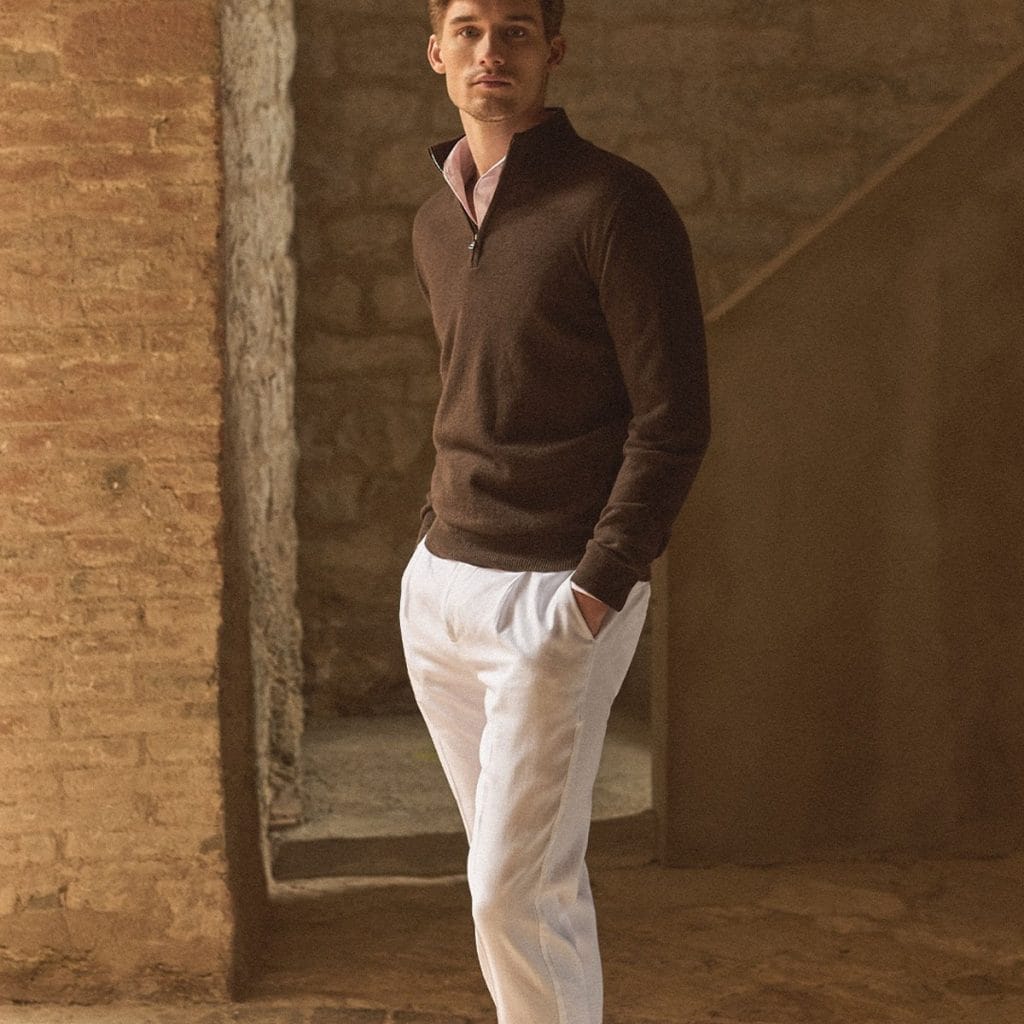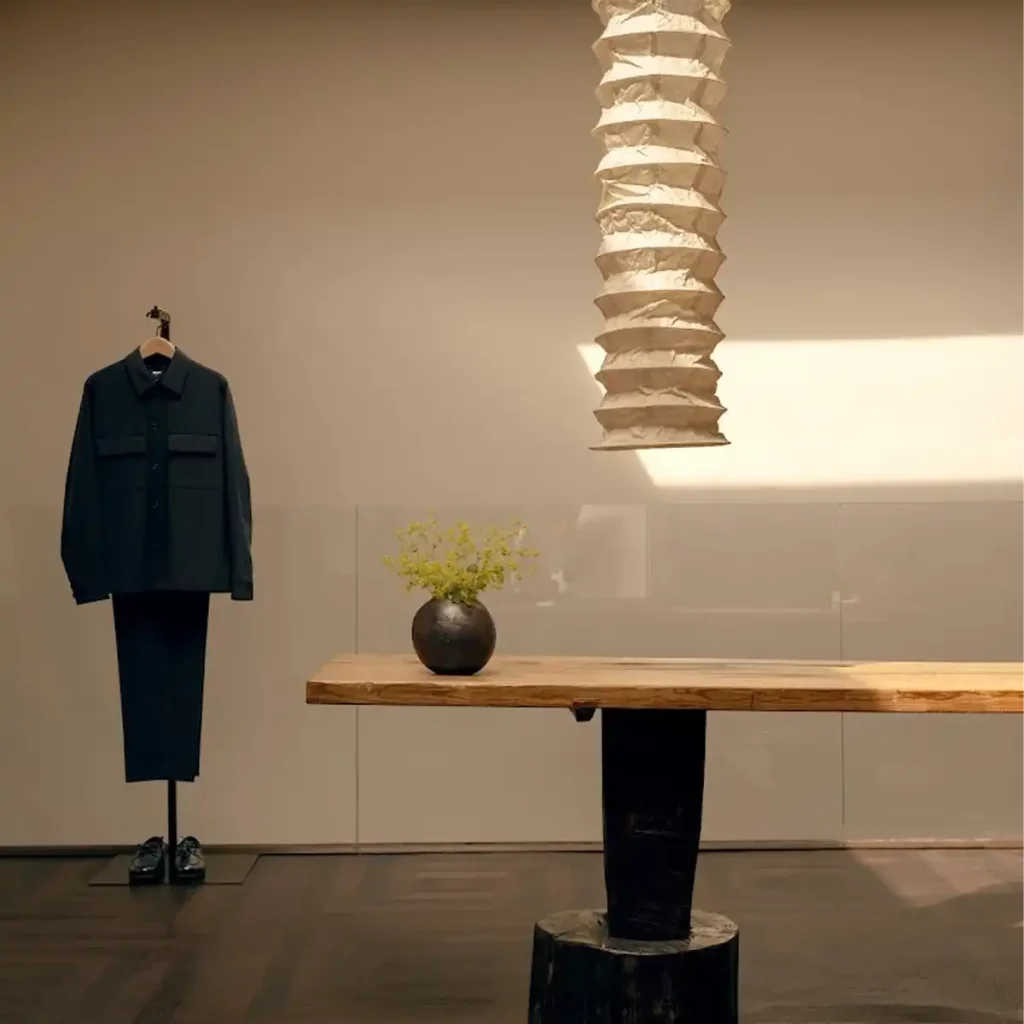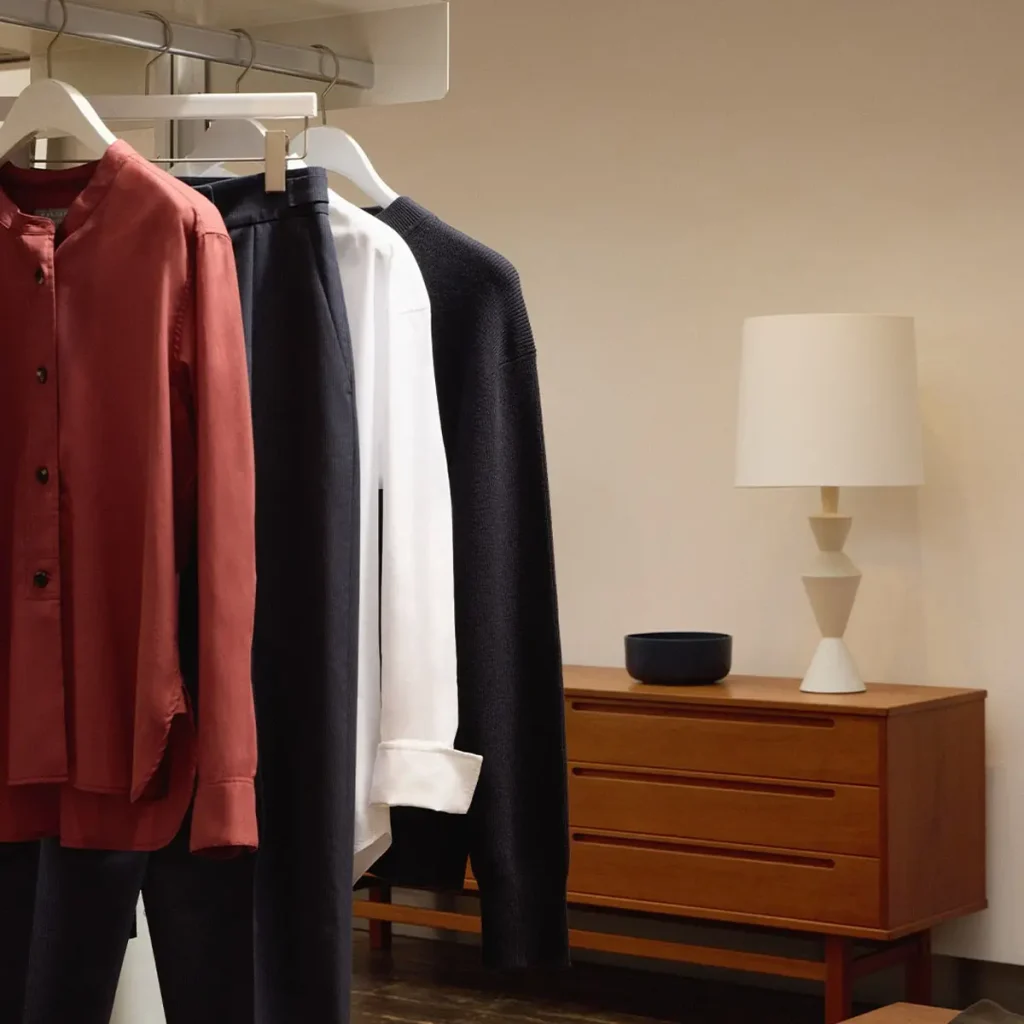Marylebone is a curious pocket of central London. Leafy with plane trees yet a brisk stroll from Oxford Circus, it offers the bustle of the city without the elbow jostle. Independent bookshops lean against Georgian terraces, and cafés trade in conversation as much as caffeine. Into this inviting setting stepped Wyse London, a women’s fashion label that believes a cardigan can spark confidence and a well-cut jumpsuit can brighten an entire street. Number 95 Marylebone High Street provides the stage. Passing shoppers glimpse rainbow knitwear through the window and pause, tempted by the promise of clothes that feel as optimistic as a spring morning in Regent’s Park.
For the visitor, the first impression is as sound as sight. A doorbell chimes, not buzzes. Timber floorboards absorb footfall, encouraging a slower gait. Garments hang with room to breathe, arranged by colour rather than trend. This deliberate calm echoes Marylebone’s own tempo. The neighbourhood has earned praise for its “village” character, yet it never slides into nostalgia. In that balance of warmth and sophistication, Wyse finds its perfect habitat.
Fun Fact: Nearly half the retailers on Marylebone High Street are owner-operated, a ratio unmatched in any other Zone 1 shopping corridor.
Founder Marielle Wyse and her second-act vision
The label exists because Marielle Wyse decided reinvention could wait no longer. After years of producing photo shoots for magazines and documentaries for the BBC, she paused to raise two children. Approaching fifty, she discovered that glossy stores pitched either to teenagers or to the couture set. Where, she wondered, was the rack of knitwear that managed to be playful, flattering and reasonably priced. Unable to find it, she created it.
Wyse’s debut range of five cashmere jumpers arrived in 2014, each one stitched in colours that refused to apologise for cheer. Online sales trickled, then flowed, all from a laptop on her kitchen table. “I am my own customer,” she told early followers, a statement that resonated far more than any marketing slogan. Women in a similar life chapter recognised a designer who understood their day-to-day realities: school gates at eight-thirty, boardroom at ten, dinner with friends at seven. Wyse offered garments that adapted without fuss.
Dual heritage sharpened her eye. French minimalism supplied the discipline, British wit supplied the sparkle. The formula: classic silhouettes enlivened by a sequin elbow patch, a flash of lurex, a scalloped hem. A business plan evolved around the same principles of authenticity and agility.
From live streams to flagship walls, the pandemic pivot
March 2020 saw the closing of fitting-room curtains across the country. For a label relying on both wholesale partners and seasonal pop-ups, the risk felt existential. Wyse pursued a direct conversation instead of cutting costs. Each afternoon, she opened Instagram Live from her living room. She held up samples to an audience that soon numbered in the thousands. Viewers voted, suggested tweaks and placed pre-orders in real time. Production ran lean, stock risk vanished and waste shrank. By September 2021, net sales had doubled compared with the previous year.
Community design, as the founder dubbed it, did more than balance spreadsheets. It forged intimacy. Customers became collaborators, stylists became friends, and the hashtag #WyseWomen took on a life of its own. The momentum demanded a physical anchor. A permanent boutique would complete the loop between screen, needle and hanger. Marylebone, with its concentration of independent labels and residential clientele, felt inevitable.
Inside the wardrobe at 95 Marylebone High Street
Step through the green-painted door and the boutique unfolds like an apartment rather than a shop. To the left sits a rail of Wyse London knitwear, stacked by hue from palest sorbet to deep damson. Straight ahead, dresses in midi and maxi lengths sway gently beneath warm pendant lights. Silk blouses line one wall, their prints referencing Provençal markets or retro London buses. A vintage rug anchors an armchair where shoppers sink, cappuccino in hand, while staff fetch alternative sizes.
The store measures a modest 500 square feet, yet zoning makes it feel larger. Mirrors tilt to flattering angles, tables showcase jewellery collaborations and an iPad station bridges any gaps in stock by ordering direct from the online warehouse. A personal stylist can be booked for one-to-one sessions or small groups, converting casual browsing into confidence coaching. Every touchpoint reinforces the brand promise: joyful clothes, thoughtfully delivered.
Magnets on the till remind visitors of the preloved platform. Customers resell past purchases to fellow Wyse London fans, earning store credit that keeps garments circulating and wardrobes fresh without waste. Sustainability lives in the swivel of a tablet rather than a lecture.
Design details that signpost the Wyse difference
Look closely and motifs emerge. Leopard print appears not as a shout but as a soft brushstroke, lined with coral piping. Trousers feature a discreet metallic side stripe. Knitwear wrists carry tiny stars in lurex thread. These flourishes reward repeat inspection and invite conversation. Materials justify their price tags: mulesing-free merino, double-gauze cotton, vegetable-tanned leather. Sizes run from Wyse 0 to Wyse 6, roughly UK 6 to 18, with popular dress cuts offered in two lengths to suit varying heights.
Such attention reflects the founder’s belief that “style is ageless while fashion passes”. Staple pieces anchor the range: perfectly weighted cashmere crew-necks, cigarette trousers that skim rather than squeeze, denim whose rise respects comfort and silhouette alike. Around these basics orbit limited-run statements, often produced to confirmed orders only. The result is a sustainable cycle that values anticipation over markdown.
Building the #WyseWomen community
Scroll the brand’s Instagram feed and faces outnumber flat lays. Teachers, surgeons, radio presenters and retired lawyers share selfies tagged #WyseWomen. Each week the label reposts favourites in a collage titled “Wyse Your Way”. It functions as free advertising yet feels more like a chat between friends. Marylebone staff know many of these digital regulars by handle first, name second, and greet them when they finally step inside the door.
In-store events turn pixels into prosecco. London Fashion Week brought ticketed styling workshops with exclusive discounts. Collaboration launches with influencers such as @mrsaddtobasket filled the boutique with laughter until closing time. Celebrity fans, from Zoë Ball to Ruby Wax, join quietly on shopping mornings, drawn by the welcoming atmosphere rather than red-rope glamour.
Community is not decoration here; it is the business engine. Each satisfied customer posts an outfit, sparking curiosity among friends, who in turn pre-order the next drop. Word of mouth outpaces paid campaigns each season.
Responsible production and pre-order pragmatism
Fashion’s environmental record invites scrutiny. Wyse responds with small-batch manufacturing, factory audits and strict chemical regulations under REACH. Wool is certified cruelty-free, leather is a by-product of the meat industry, and cotton is never sourced from forced-labour regions.
The pre-order mechanism, refined during lockdown, remains central. If interest in a style fails to reach a minimum threshold, it is shelved rather than forced to market. Unsold samples head to charity partner New Life. For garments already in circulation, the preloved platform extends life cycles and rewards sellers with an extra ten per cent of the resale value as store credit, encouraging circular shopping.


Why Marylebone matches the Wyse mindset
Oxford Street may draw crowds, Bond Street may entice luxury budgets, yet both can feel transactional. Marylebone offers something subtler: discovery allied with approachability. Independent retailers sit shoulder to shoulder with heritage chemists and family grocers, cultivating loyalty across generations. Marielle Wyse considered the address essential. “It has inclusivity without losing sophistication,” she says, positioning her brand squarely in the “demi-luxe” bracket. Here, curiosity outweighs status, and quality starts conversations.
Opening on Marylebone High Street placed Wyse alongside peers such as Daunt Books, Community Clothing and Self-Portrait, whose shared values centre on craft and considered living. Customers wandering the village cluster find visual harmony rather than aggressive branding, an atmosphere that mirrors Wyse’s own ethos.
Plan your Marylebone fashion walk
Any visit to Wyse London can anchor a relaxed day. Begin with coffee at Monocle Café, browse scented globes at Diptyque, then turn the corner to Daunt Books for a travel title. After selecting your knit of choice at number 95, cross to Skandium for homeware and finish with a seasonal lunch at The Ginger Pig café. The loop rewards curiosity and supports independent trade, an echo of Wyse’s founding values.
Part One closes having explored the label’s origins, pandemic ingenuity, boutique design and ethical framework. Part Two now shifts to a deeper product analysis, customer profiles, sustainability metrics and a structured plan for readers who wish to shop, style and share their Marylebone finds.
The wardrobe that works seven days a week
Wyse collections evolve in capsules, each one tested with that Instagram focus group before landing on rails. Core knitwear appears in cashmere, merino and cotton, all knitted tightly to resist pilling. Crew-necks receive neon tipping at cuffs, V-necks conceal a star at the neckline, cardigans fasten with contrast buttons lifted from vintage archive photos. Dresses lean toward midi for versatility. Popular shapes such as the Margot cotton poplin shirt dress return each season in new prints, from painterly florals to classic Breton stripes.
Trousers bridge the gap between smart and casual with elasticated back waistbands hidden under structured fronts. Denim earns particular praise for its soft stretch and mid-rise cut that flatters without restricting movement. A recent review from Good Housekeeping lauded the Rochelle Jean as “desk to dog-walk perfection”.
Accessories extend the colour story: knitted snoods, star-intarsia gloves, metallic leather trainers and stripe-tipped socks. All are produced in the same limited runs, granting a feeling of discovery to those who buy early.
How Wyse measures trust
Transparent communication sits alongside design flair. The website publishes an annual Sustainability Report summarising supplier audits, carbon footprint reduction and fabric sourcing milestones. Factories in Italy, Portugal and China receive unannounced checks by independent auditors. Chemical usage complies with REACH, while transport choices favour sea freight over air whenever schedules allow.
Certification can feel abstract to customers, so Wyse embeds proof inside garments. A limited-edition organic cotton T-shirt carries a QR code linking to the fibre’s journey from farm to factory. For most lines, the hangtag notes origin by country, yarn by weight and suggested aftercare, encouraging customers to mend and refresh rather than discard.
Marylebone staff undergo quarterly workshops on fibre innovation and fit adjustments to equip them with knowledge that builds shopper confidence. Questions about care, provenance or repair are welcomed and answered without jargon.
#WyseWomen profiles: who buys, and why
Data from mailing-list surveys paints a portrait of the average Wyse London customer: mid-forties, urban, juggling career and family, with an eye for design that balances practicality and flair. She is less interested in seasonal trends and more excited by personal styling tricks. Many discovered the brand during lockdown live streams and appreciated the founder’s candour about fit, fabric and price.
In-store, age ranges widen. Daughters borrow cashmere tanks from mothers; grandmothers invest in leopard silk scarves. The common thread is joy. Customers often remark on how a flash of colour at the collar lifts mood on grey commuting mornings. Such emotional resonance converts first-time visitors into repeat buyers who happily queue outside for new-drop previews.
Community events that blur retail and friendship
Twice a month, the boutique hosts after-hours gatherings. Some centre on seasonal styling advice, others celebrate collaboration launches. Tickets are modestly priced or free for newsletter subscribers, reinforcing inclusion. Guest speakers range from nutritionists to portrait photographers, emphasising lifestyle rather than pure commerce. Attendees mingle over fizz, compare outfit choices and leave with Polaroid snapshots as keepsakes.
During December, the window becomes an advent calendar, each day revealing another preloved piece restored and ready for new life. Proceeds support Centrepoint, linking ethical retail to local social impact. Last year, the initiative funded thirty winter sleeping bags.
Integrating online convenience with store charisma
While community drives loyalty, convenience secures conversion. The boutique’s iPad ordering stations pull live stock data from the warehouse, allowing split payments between gift cards, store credit and standard checkout. Collect-in-store remains the most popular option as it guarantees a try-on session with on-site alterations if needed. Returns prove minimal: 4 per cent against an industry average above 15 per cent.
Customers abroad can still tap into the Marylebone spirit. Weekly Instagram Lives continue, now filmed from a corner of the boutique so viewers glimpse fixtures and chat with visiting shoppers. The brand ships to forty countries, yet feedback loops remain tight. Every parcel includes a hand-signed thank-you card from the stylist team.
Future outlook: scaling without dilution
Expansion often spells compromise, but Wyse plans cautiously. Second boutiques may appear in Bristol or Edinburgh, cities whose independent shopping culture mirrors Marylebone’s. Pop-ups in Paris and Copenhagen test appetite without long leases. Wherever the label travels, the founder insists on keeping production runs limited and interactive design sessions alive.
Investment focuses on technology that predicts size demand more accurately, reducing samples and returns. Recycled cashmere yarn trials begin next season, and early prototypes suggest no sacrifice in softness. Retail partnerships remain selective, limited to stores that honour the community ethos.
A closing reflection and invitation
Wyse London has flourished by trusting instinct over algorithm. A founder who designs for herself, a community that co-creates collections, a location that favours conversation over turnover: these elements weave together into a fabric as resilient as it is colourful. When you next walk Marylebone High Street, listen for that doorbell, step into the wardrobe of dreams and allow a spark of colour to rewrite your day. As Londoners remind one another, “Good things come to those who wait, but better things come to those who go out and get them.”



